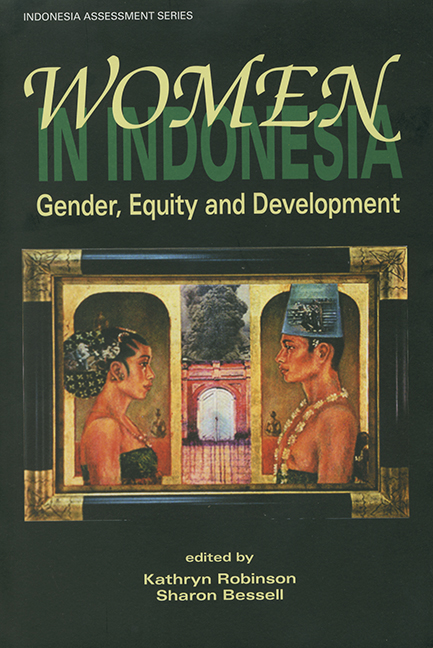Book contents
- Frontmatter
- Contents
- Tables
- Figures
- Contributors
- Acknowledgments
- Glossary
- Prologue
- 1 Introduction to the Issues
- 2 The Mega Factor in Indonesian Politics: A New President or a New Kind of Presidency?
- 3 The Downfall of President Abdurrahman Wahid: A Return to Authoritarianism?
- 4 The Year in Review: From Blind Man's Bluff to Mega Expectations
- 5 Further Comments on the Economy, with a Gender Perspective
- 6 Institution Building: An Effort to Improve Indonesian Women's Role and Status
- Commentary
- 7 Feminism in Indonesia in an International Context
- 8 Gay and Lesbi Subjectivities, National Belonging and the New Indonesia
- 9 And the Winner Is … Indonesian Women in Public Life
- 10 Indonesian Women Artists: Transcending Compliance
- 11 Literature, Mythology and Regime Change: Some Observations on Recent Indonesian Women's Writing
- 12 Women and the Labour Market during and after the Crisis
- 13 Women's International Labour Migration
- 14 Customary Institutions, Syariah Law and the Marginalisation of Indonesian Women
- 15 Women's Grassroots Movements in Indonesia: A Case Study of the PKK and Islamic Women's Organisations
- 16 Women's Activism against Violence in South Sulawesi
- 17 Gender Mainstreaming and Sex-disaggregated Data
- 18 The Changing Indonesian Household
- 19 Women, Family Planning and Decentralisation: New Variations on Old Themes
- 20 Men, Women and Community Development in East Nusa Tenggara
- References
- Index
- INDONESIA ASSESSMENT SERIES
10 - Indonesian Women Artists: Transcending Compliance
Published online by Cambridge University Press: 21 October 2015
- Frontmatter
- Contents
- Tables
- Figures
- Contributors
- Acknowledgments
- Glossary
- Prologue
- 1 Introduction to the Issues
- 2 The Mega Factor in Indonesian Politics: A New President or a New Kind of Presidency?
- 3 The Downfall of President Abdurrahman Wahid: A Return to Authoritarianism?
- 4 The Year in Review: From Blind Man's Bluff to Mega Expectations
- 5 Further Comments on the Economy, with a Gender Perspective
- 6 Institution Building: An Effort to Improve Indonesian Women's Role and Status
- Commentary
- 7 Feminism in Indonesia in an International Context
- 8 Gay and Lesbi Subjectivities, National Belonging and the New Indonesia
- 9 And the Winner Is … Indonesian Women in Public Life
- 10 Indonesian Women Artists: Transcending Compliance
- 11 Literature, Mythology and Regime Change: Some Observations on Recent Indonesian Women's Writing
- 12 Women and the Labour Market during and after the Crisis
- 13 Women's International Labour Migration
- 14 Customary Institutions, Syariah Law and the Marginalisation of Indonesian Women
- 15 Women's Grassroots Movements in Indonesia: A Case Study of the PKK and Islamic Women's Organisations
- 16 Women's Activism against Violence in South Sulawesi
- 17 Gender Mainstreaming and Sex-disaggregated Data
- 18 The Changing Indonesian Household
- 19 Women, Family Planning and Decentralisation: New Variations on Old Themes
- 20 Men, Women and Community Development in East Nusa Tenggara
- References
- Index
- INDONESIA ASSESSMENT SERIES
Summary
The rise of Megawati Sukarnoputri to the presidency is an inspiring story of a woman's transcendence from compliance to non-compliance, from invisibility to determined exposure. Enduring public scorn, defamation and even victimisation, Megawati has never retaliated. Instead she persisted in silence, while nurturing an inner strength that conquered the fiercest arguments against a woman becoming leader. Turning the tide, she became Indonesia's first woman president.
The rise of Indonesian women artists to prominence takes a similar pattern. Facing discrimination by curators and art historians, they kept silent, as was expected of women in the traditional context. Besides, as one artist revealed, it was beneath their dignity to protest about discriminative selection. Instead, they worked harder, did better and excelled. At the dawn of the new millennium a change was tangible in the world of art, culminating in the first half of 2001 in two large exhibitions by women artists at Galeri Nasional and Bentara Budaya Jakarta. This chapter focuses on change and innovation in art from a women's perspective.
THE GENDER PERSPECTIVE
The independence struggle was perhaps the first step to liberating women from domestic captivity; the 1945 Constitution accorded the same rights and responsibilities to both men and women. In reality, however, women were relegated to domesticity and women's organisations were undermined. The first National Women's Congress was held in 1928 (see Indar Parawansa, Chapter 6). The federation grew, leading to the formation of Kongres Wanita Indonesia (Kowani) in 1946. This umbrella group of over 70 women's organisations was drawn into supporting the male-determined goals of state development, particularly under the Soeharto regime (1966–98). Meanwhile, NGOs focusing specifically on women emerged, producing a new generation of women activists – whose strength increased even more following the economic and monetary crises of 1997 and the mass rapes of ethnic Chinese women that took place in Jakarta in May 1998.
As women stood up and presented a united front, they realised that so-called ‘women's concerns’ were in fact closely linked to the main game of politics, from which women were largely excluded. It also became clear that atrocities against women had occurred long before the May rapes, in other parts of the country such as Aceh and Irian Jaya.
- Type
- Chapter
- Information
- Women in IndonesiaGender, Equity and Development, pp. 113 - 129Publisher: ISEAS–Yusof Ishak InstitutePrint publication year: 2002



